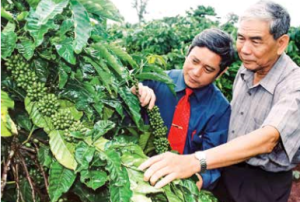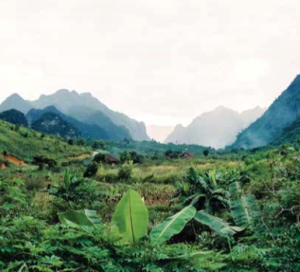Cultural History of Fine Coffee an introduction to the History of Coffee in Vietnam
Vietnam has several professional "coffee kings" whose outstanding contributions have enabled Vietnam to grow into the world's second largest coffee producer outside Brazil in recent years. Several other coffee figures who have contributed silently are DoanTrieuNhan, who has focused on the growth of national coffee production since the end of the Vietnam War, which can be said to be the main planner of the Vietnam Coffee growth Plan.
DoanTrieuNhan grew up in North Vietnam and has been exposed to coffee for more than half a century. When he was growing up, he experienced changes in the whole coffee industry. From avoiding bombing during the war, the dream of Republican Vietnam, the barter trade in the socialist period, until entering the free trade market in the early 1990s. The World Coffee contract (InternationalCoffeeAgreement) allowed Vietnam to successfully enter the world coffee market without being subject to minimum prices and quotas.
The 79-year-old Nhan can be said to be a key figure in promoting Vietnam's Coffee growth Plan, but his attitude is still very modest. His plan turned Vietnam's small potatoes in the coffee kingdom into giants, and his plan helped the country rebuild and maintain its prosperity to this day. "I am very happy to see that the life of coffee farmers can improve," Nhan said modestly in an interview. "I'm not giving that much. I'm just doing what I'm supposed to do to let coffee farmers in Vietnam be known and seen." but in fact, Nhan's efforts are hard not to be seen. Both local and foreign visitors, Nhan, invite them to vicofa, where he served as chairman of the Vietnamese Coffee and Cocoa Association Office (vietnamCoffeeAndCocoaAssociation) in Hanoi for almost two decades until he left office in 2006 at the age of 74. Even after leaving office, he still keeps his office and there are often visitors from all over the world who want to see the "hidden mirror man" behind the success of Vietnam's coffee industry. It has always been known that his title is Mr. Coffee in Asia.

Nhan has been working on the dream of reunifying North and South Vietnam since he was a student. In 1964, the year before the Battle of Xisheng, Nhan received a scholarship for a master's degree in soil science in southern China.
Nhan graduated in 1967 and returned to Vietnam to start working at the PhuQuy Rainforest Agricultural Research Station (PhuQuayTropicalCropResearchStation) in Nghe. The Tropical Rainforest Agricultural Research Station, a research organization under the Department of Agriculture, went on to work with the Vietnamese government to devise plans for how to rebuild war-torn Vietnam. Vietnam had a population of about 70 million at that time and most of the people needed to work. The Vietnamese government quickly identified two main reconstruction priorities, education and work. "the government asked everyone to come up with a product that could help society grow," Nhan recalled. "I had studied all the rain forest products when I was studying in China, so I began to look for products that could be produced locally and exported. Coffee is an advantageous product because we have many countries to cooperate with, and there are a lot of basalt laterite in the country, and the only thing that is lacking is agricultural manpower. " "We also know that we need a lot of educators to rebuild the country after the war, but the question is what if young people don't want to stay in school," Nhan added. "Schools and universities continue to open during the war."
As the front line of the war moved south, Nhan began to focus on Yi'an Province in the north-central part of the country. He began to visit coffee farms left in the province during the French colonial period, and Nhan became convinced that coffee would play an important role in Vietnam's future economic growth. Nhan felt that the development of coffee beans to become high-yielding agricultural products would be the focus of social development. "We cannot rely on outsiders to help rebuild Vietnam, and we need to help create better opportunities for people of more than 70 different local tribes in the province."
The original goal of Nhan's development plan was to allow Vietnam to produce 6 to 7 million packets of 60-kilogram coffee beans to compete with Indonesia, the largest coffee producer in Asia and the third largest coffee producer in the world at the time. Indonesia had export quotas at that time, but Vietnam did not. Therefore, the production of coffee in Vietnam is monitored according to the demand of other socialist countries, so that Vietnamese coffee beans can have a better trading price.
When the Vietnam War ended in 1975, Nhan visited the central highlands of southern Vietnam, where he made more plans to start growing coffee. In mid-1980, the Vietnamese government began planning to grow Arabica coffee, but this time the planting area is focused on poor and remote areas of the north, where there are local minorities. We started growing Arabica coffee beans in the Sonla area in 1989, and I am very pleased to see today how coffee cultivation has improved the lives of their local people. "some farmers in Sonla can own about 1000 hectares of farmland, and they can use the money earned from coffee to build new houses or buy new motorcycles," Nhan said. It is hard to deny that it is a good plan for the Vietnamese government to use coffee cultivation to improve the social environment. In 2012, there were more than 1 million people doing coffee-related jobs across the country, including farmers and workers. And together with the income of all coffee-related industries, it could improve the lives of about 3 million Vietnamese.

The rise of the coffee industry has allowed Vietnam to grow in the same way as other agricultural products such as black pepper, cotton and cocoa. Every time you visit a remote coffee farm, you can see the improvement in the living standards and standards of the local people, and there can be better local construction, and then gradually there is running water and electricity.
Looking back on Nhan, there are still many happy memories of his childhood in North Vietnam, sad memories of the separation of the country caused by the war, and the excitement of young agricultural experts visiting coffee farms. Nor could he hide the surprise of watching coffee farmers in Vietnam create several times more than the government's estimated output at the time. Vietnam produced 5.7 million packets of coffee from 1996 to 1997, and 6.9 million and 7 million packets respectively in the next two years. The price of coffee beans reached a new record of $3.19 a pound in May 1997, and coffee farmers in Vietnam began to develop coffee farming as rapidly as Colombia, Brazil, Uganda, Mexico, Guatemala, India and Indonesia. "at that time, people began to grow more coffee. Coffee farmers began to become 'coffee king' and more and more people began to want to grow coffee. "Vietnam was criticized for overproduction of coffee beans in 1999-2000, and many people believed that this situation was the main reason for the sharp drop in market prices. The criticism comes mainly from other coffee-producing countries around the world, which have benefited a lot from export quotas for years, but Vietnam has not received any quotas. Nhan says he doesn't care about the criticism at all. "these criticisms are unfair and incorrect, because rapid growth like Vietnam is not a government policy or plan, but the hard work of every coffee farmer," Nhan said. "every time coffee prices fall, Vietnamese coffee farmers are affected as well as coffee farmers in other countries."
In the years of the coffee price crisis, vicofa received a lot of international criticism for not telling everyone about the actual domestic coffee production. "We can't control what crops farmers can grow on their farmland. It's their own decision, which I can't interfere with. Coffee farmers in Vietnam grow coffee very well, "Nhan said with a smile, which is undeniable.
Important Notice :
前街咖啡 FrontStreet Coffee has moved to new addredd:
FrontStreet Coffee Address: 315,Donghua East Road,GuangZhou
Tel:020 38364473
- Prev

The birthplace of coffee, Ethiopian coffee.
In the world of coffee, there are countless stories and reports about Ethiopia: the birthplace of coffee, the story of shepherds, black gold, and so on. Ethiopia's coffee culture and popularity are so shocking that even some coffee bars at the airport have four professional semi-automatic coffee machines, whether in urban or rural cafes, western restaurants, Chinese restaurants or hotel bars.
- Next

The Cultural History of Coffee Coffee divination in Turkey
Coffee divination, also known as "Greek coffee divination" or "Turkish coffee divination", is also popular in countries once ruled by the Ottoman Turkish empire. The origin of coffee divination due to the continuous disputes between Turkey and Greece before, so if you come to Greece, don't say you want a cup of Turkish coffee, otherwise you will get two.
Related
- How did the Salvadoran coffee industry develop in Central America?
- What exactly does the golden cup extraction of coffee mean?
- The Origin of Coffee flower
- [2023 Starbucks World Earth Day] there are more meaningful things besides free Starbucks coffee!
- What kind of coffee is there in Spain? 9 Flavors of Spanish Coffee
- Aromatic African coffee| Kenya's coffee culture and historical production area
- Liberica Coffee Bean knowledge: the characteristics of Liberian Coffee beans of the three original species of Coffee beans
- The origin and formula of Spanish latte introduces the taste characteristics of Bombon coffee in Valencia, Spain.
- How to adjust the solution of over-extracted coffee
- What is the tasting period of coffee beans? What is the period of coffee and beans? How should coffee wake up and raise beans?

